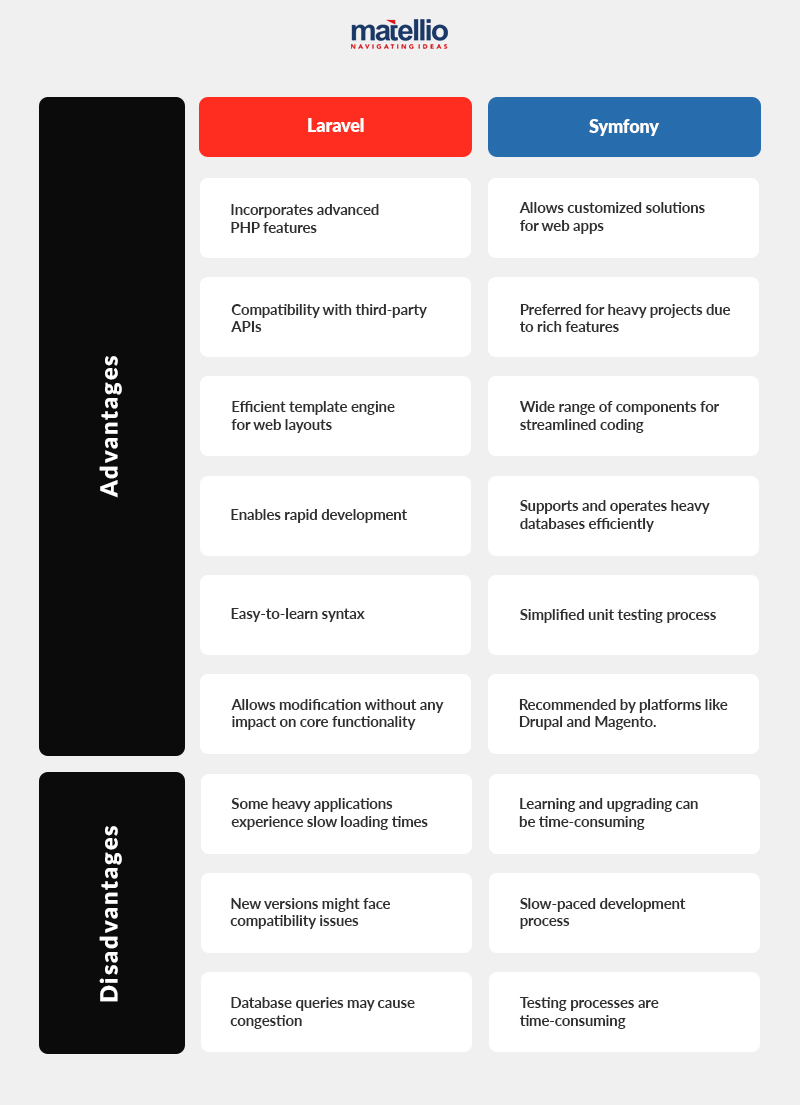
Having an online presence is key for every business to connect with its audience. Building an app or website is the first and most stable idea that an enterprise can think of to fulfill this purpose. And, when it comes to building a website, finding the right web development services or dedicated developers is a whole new ballgame.
But during this process, you also have to select the right web development framework. That’s right where you get to witness the Laravel vs Symphony debate. Let’s get the backstory. PHP is a hard-to-miss web development framework while exploring the options. Moreover, a whopping 79.2% of websites prefer PHP programming, making it a top choice among developers.
But here’s the problem: Laravel vs Symfony, which PHP framework can work the best for your business? We understand the confusion can be overwhelming. That’s why in this blog we’ll dive deep into both frameworks, comparing their features, benefits, and most importantly, their differences. Keep reading to get all the details you need to make an informed decision for your web development needs.
About Laravel
Laravel isn’t just a popular PHP framework; it’s a trusted web development ally for many business leaders.
Now, in the ongoing debate of Laravel vs Symfony, what sets Laravel apart? While many may see this debate differently, most developers believe that this framework helps with innovation and elegant syntax. It also supports an MVP (Model-View-Presenter) architecture. So, one thing is clear; Laravel can function seamlessly but also look incredibly sleek.
Tech experts also favor it because of its lightning-fast writing style that almost magically reduces the need for complicated configurations. Plus, it’s a master at recycling existing elements from different frameworks, making the development journey a breeze. And guess what? With the arrival of Laravel 10, it’s like giving wings to your tech dreams. The version is a game-changer, simplifying the development process in ways you wouldn’t believe.
Now, let’s talk business. With Laravel by your side, you can wave goodbye to the days of tangled and convoluted code. How? It lets you effortlessly separate your business logic code from your display code, creating a harmonious blend of lightweight and automated coding. It’s like having a magic wand that streamlines your work, leaving you with more time to focus on what truly matters – building exceptional web applications.
And security? Laravel takes that seriously. It’s not just a framework; it’s your shield against the threats lurking in the digital world. Equipped with built-in authentication and password options, Laravel stands guard, protecting your precious data from the clutches of hackers and malware attacks. Your data? It’s safe and sound, allowing you to breathe easily and concentrate on pushing your projects to new heights.
Now, let’s unravel the treasure trove of features that make Laravel your ultimate choice in the Laravel vs Symfony battle:
 Support for the Model-View-Controller (MVC) Design Pattern
Support for the Model-View-Controller (MVC) Design Pattern
Laravel can be the architect for the blueprint of your application. It stimulates a clear division between its logic, presentation, and user experience.
 Integrated Authentication and Session Solutions
Integrated Authentication and Session Solutions
This PHP framework doesn’t just build apps; it builds secure fortresses. With authentication and session management seamlessly woven into its core, your users can interact with your application worry-free, knowing their data is in safe hands.
 Enriched Unit Testing Capabilities
Enriched Unit Testing Capabilities
Bugs? Glitches? Not on Laravel’s watch. When you hire Laravel developers, rest assured that the testing will be robust. It allows experts to identify and fix issues before they even become problems, ensuring your application runs like a well-oiled machine.
 Blade Templates Engine
Blade Templates Engine
You can think of Laravel as your artistic canvas. Blade templates engine simplifies the process of creating stunning and dynamic web pages. It’s your ticket to crafting visually appealing interfaces that keep users coming back for more.
 Access to the Artisan Command-Line Tool
Access to the Artisan Command-Line Tool
Artisan is a command-line tool empowering developers to perform a myriad of tasks with simple commands. With this PHP framework, you get this tech-savvy helper right at your fingertips.
About Symfony
Now, let’s walk you through the story of Symfony, a powerhouse in the world of web development, and an integral player in the ongoing debate of Laravel vs Symfony.
Much like Laravel, Symfony is a marvel among the PHP subsets. Fun fact: even Laravel, the reigning PHP champion, relies on approximately 14 Symfony components. That’s how influential Symfony is in shaping the digital landscape.
You can consider it as a virtuoso that blends various PHP components in harmony to create exquisite web applications. Its journey began in 2011 with a noble mission – to simplify the cumbersome web app development process, liberating developers from the chains of repetitive coding.
Why is Symfony exclusive? It has reusable PHP components and can help developers build impeccable tracking solutions. These elements transform complicated projects into manageable tasks, making Symfony your go-to tool when the process gets complex. Whether you’re crafting a dynamic website, a robust web application, or anything in between, Symfony rises to the occasion. Want a tailored website or app? In that case, you can hire dedicated developers who specialize in this framework and can offer their expertise in customization.
Let’s now glance at the key features of Symfony to better understand the comparison between Laravel vs Symfony.
Uses Twig Templating Language
Imagine you have beautiful, dynamic web pages with the elegance of a skilled artist. Seems fascinating, right? With Symfony, you get Twig: a templating language that allows you to do just that. It’s not just code; for your chosen developer it will bring life to your digital canvas.
Delivers Flexible URI Routing
This feature makes sure your website’s pages are easy to find. It’s like having clear road signs on the internet. With URI routing users will find it simple to navigate your site smoothly, finding what they need without getting lost.
Provides Ease of Development
Symfony makes building your digital products straightforward. It consists of all the tools required to make your process smooth and website user-friendly. That’s why Symphony is popular among developers as it allows them to turn their ideas into reality without facing unnecessary complications. So, your business can make the website or software development journey smooth and hassle-free.
Quick Debugging Solutions
In the tussle of Laravel vs Symfony, the latter proposes several reasons in its favor. One such reason is its prompt bug resolution. When there are problems in your website or app, the PHP framework helps find and fix them quickly.
Builds Structured MVC (Model-View-Controller)
MVP is the backbone of every robust application. Symfony’s structured MVC architecture ensures your projects are not just functional but also maintainable and scalable. It offers a solid foundation and base on which your website is built.
Also Read- Laravel VS React: Which One Fits Your Project Best?
Laravel Vs Symfony: Comparing Advantages and Disadvantages

Laravel vs Symfony: The Ultimate Face-Off Based on Key Parameters
Choosing the right PHP framework is a lot about choosing the right tool to prepare the brick-and-mortar of your web development project. Thus, comparing them on all parameters possible is a wise decision before you make an investment. Here are some factors that’ll equip you to make an informed decision and work seamlessly with you and your web development partner.
Ease of Learning and Documentation
| Laravel | Symfony |
|---|---|
| It’s known for its elegant and intuitive syntax, making it a fantastic choice for those who are new to PHP frameworks. The documentation of this framework is no less than a goldmine. With a vast community that actively contributes to keeping it updated, Laravel is a great choice for web development. Any team you choose will easily attain the speed and make your project progress without any glitches. | Symfony, on the other hand, is like the wise sage of PHP frameworks. It’s a little bit more complex and might have a steeper learning curve for beginners. But, its extensive documentation can offer you every detail required. Thus, in terms of learning and documentation, it’s a fair choice if your development partner has PHP experience. |
Community and Ecosystem
| Laravel | Symfony |
|---|---|
| When it comes to community support, Laravel is a star. It can help gain a huge and enthusiastic user base, ensuring you can find answers to your questions with a vast library of third-party packages to boost your development process. The ecosystem it provides is filled with tools, libraries, and resources. In this sense, it’s ideal for you if you’re looking to expand and adapt your business quickly. | It doesn’t lag behind when it comes to the community game. While its community might be smaller compared to Laravel, it’s dedicated and reliable. Symfony’s ecosystem also offers a wide range of components that can simplify complex tasks. So, it’s suitable for projects that demand intricacy and a high level of customization. |
Flexibility and Customization
| Laravel | Symfony |
|---|---|
| This PHP framework excels in providing a streamlined and opinionated way of doing things. It’s perfect if your project fits within the predefined structure it has. The only roadblock is that it can sometimes limit your flexibility and customization options. So, if your project can proceed within the boundaries of Laravel’s conventions, you can get benefits from its speed and ease of development. | Customization and flexibility are parameters where Symfony shines bright in the Laravel vs Symfony debate. It’s a great choice if you want to launch something unique and do not want to take the regular development path. The framework has components that your team can use independently, allowing them to build solutions that align perfectly with your business needs. |
Performance
| Laravel | Symfony |
|---|---|
| In terms of speed, Laravel is excellent. It’s designed to handle everyday web development tasks with finesses, making it a top contender for several types of projects. Its performance can serve your business as an asset, maintaining its smooth running and efficiency. | It’s a PHP framework with a modular architecture that also offers great performance. It’s a great pick for large and complex models that demand robust performance and scalability. Symfony’s solid structure makes it a go-to framework for high-traffic apps and websites, giving you the confidence that your system can handle the load. |
Security
| Laravel | Symfony |
|---|---|
| Amidst the Laravel vs Symfony debate, Laravel’s superiority becomes evident when it comes to security. It has built-in security features like protection against SQL injection, cross-site request forgery (CSRF), and cross-site scripting (XSS). It also offers a simple way to handle user authentication and authorization. These measures can significantly take care of the security of your project. | Symfony does not lag in the realm of security. It offers a solid foundation for security. However, there’s a slight complexity. Suppose you want a SaaS platform built with Symphony. In that case, you’ll have to hire a SaaS development company that has expertise and experience in building secure SaaS platforms using Symfony. |
Integration and Compatibility
| Laravel | Symfony |
|---|---|
| Laravel has a focus on convention over configuration. This makes integrating the framework with diverse tools, and databases, and third-party services easier. It is also too easy to incorporate with popular tools like Redis, Elasticsearch, and more. Thus, Laravel is a good choice if your key focus if you a straightforward project that requires an easy integration process. | With its flexible architecture, Symfony allows the integration of wide components and libraries. It’s often chosen for projects that need a high level of flexibility for deep integrations and compatibility with various systems. So, if you are in need of a tailored solution that might be complex when it comes to integrations, you can go with Symfony. |
Laravel Vs Symfony: Technical Aspects to Consider
| Technical Aspect | Laravel | Symfony |
|---|---|---|
| Usage Statistics | Backs 1.94% of the top one million websites on the internet. | Holds 0.22% of market share in leading countries as a web app framework |
| Speed | Websites take 60-80 milliseconds to load | Websites take 200-250 milliseconds to load |
| Server Requirement | PHP, Apache, Nginx, MySQL/MariaDB | PHP, Apache, Nginx, MySQL, PostgreSQL |
| Installation | Composer-based, straightforward setup | Composer-based, relatively easy installation |
| Data and Migration | Eloquent ORM simplifies database operations and migrations | Doctrine ORM for managing database and migrations |
| Template Engine | Blade templating engine, intuitive and efficient | Twig templating engine, highly flexible and readable |
| Community Support | Large and active community, extensive documentation | Active community, comprehensive documentation available |
| Performance Optimization | Laravel Mix simplifies asset compilation and optimization | Symfony Encore for efficient asset management and optimization |
| Official Packages | Laravel provides official packages like Passport and Horizon | Symfony offers packages like MakerBundle and Security |
The Bottom Line
In the ongoing “Laravel vs Symfony” debate, the focus isn’t on one being superior to the other; it’s about choosing the right tool for your specific project.
Laravel, with its simplicity and strong community, suits straightforward projects and startups. On the other hand, Symfony’s flexibility shines in complex, enterprise-level applications.
Ultimately, the choice should align with your project’s unique requirements and your team’s expertise. Whether you prefer Laravel’s friendly community or Symfony’s depth of features, you’re one step closer to a successful web development journey.
Work closely with Matellio, share your project needs, and let the ultimate PHP framework become your trusted ally on the path to digital success. Fill out this form now and get started with your project with the best web development team!

 Support for the Model-View-Controller (MVC) Design Pattern
Support for the Model-View-Controller (MVC) Design Pattern Integrated Authentication and Session Solutions
Integrated Authentication and Session Solutions Enriched Unit Testing Capabilities
Enriched Unit Testing Capabilities Blade Templates Engine
Blade Templates Engine Access to the Artisan Command-Line Tool
Access to the Artisan Command-Line Tool



